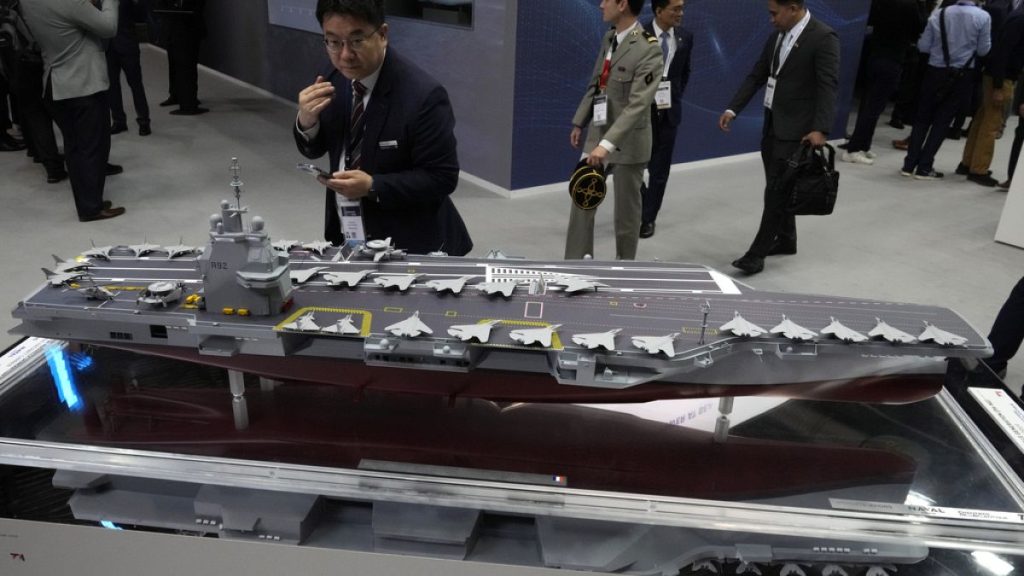The European Union has been facing increasingly complex security crises around the world, leading to calls for the prioritization of its military sovereignty. The recent Euronaval trade show in Paris focused on the potential for stronger pan-European cooperation in the maritime defence industry, with discussions around the possibility of building a next-generation combat ship for the 2040s. This concept has gained momentum due to ongoing conflicts like the war in Ukraine and concerns about the reduction of military support from the United States under President Donald Trump. The director of Euronaval emphasized the importance of unity among European nations in order to compete with other global powers like China, the USA, and India. The idea of a joint European frigate project is seen as a step towards a more cohesive and effective European navy, with member states considering requirements such as incorporating artificial intelligence technology into the future vessel.
The European Defence Agency noted that multiple attempts have been made in the past to launch a European frigate project, but none have been successful. However, there is optimism that progress can be made in the near future, with member states showing interest in the idea of a ‘smart ship’ that utilizes advanced technologies. The French naval industry, represented by the trade association GICAN, is supportive of increased cooperation at the European level and sees the potential for European nations to strengthen their naval capabilities while maintaining sovereignty within a NATO framework. The upcoming meeting of the bloc’s defence ministers in November will provide an opportunity to further discuss the project and potentially move forward with a letter of intent. This demonstrates a growing recognition of the need for a more unified and proactive approach to European defence and security.
The concept of a European military ship of the future highlights the importance of the EU taking greater responsibility for its own defence in the face of evolving security threats. The idea of a joint European frigate project reflects a desire for increased cooperation and unity among member states, as well as the recognition that fragmented efforts will not be sufficient to meet the challenges of modern warfare. The proposed ‘smart ship’ aims to bring together cutting-edge technologies such as artificial intelligence to enhance the capabilities of the future vessel. By working together on such a project, European nations can not only strengthen their own naval forces but also project a more cohesive and effective presence on the global stage.
The European Union’s potential for a joint European frigate project represents a significant step towards a more integrated and capable European navy. By pooling their resources and expertise, member states can develop a next-generation combat ship that meets the demands of modern warfare and enhances Europe’s ability to defend its interests and contribute to international security efforts. The support from industry associations like GICAN underscores a willingness among European companies to collaborate on large-scale defence projects and contribute to the continent’s security and defence capabilities. The upcoming meeting of defence ministers to discuss the project further indicates a growing momentum towards greater European military sovereignty and cooperation in the maritime defence sector.
Moving forward with the idea of a European frigate project will require a strong commitment from member states to invest in the development and production of the future vessel. This includes not only financial support but also a willingness to prioritize cooperation and unity in order to achieve a common goal. The potential for a European navy that can rival other global powers like China, the USA, and India hinges on the ability of European nations to work together towards a shared vision of enhanced defence capabilities and sovereignty. By taking concrete steps towards a joint European frigate project, the EU can demonstrate its readiness to meet the challenges of the future security landscape and assert its role as a key player in global security affairs.
In conclusion, the discussion around the potential for a European military ship of the future serves as a reminder of the need for the EU to prioritize its defence sovereignty and enhance its military capabilities. The concept of a joint European frigate project offers an opportunity for member states to work together towards a common goal of strengthening European naval forces and projecting a more unified and effective presence on the world stage. By embracing advanced technologies such as artificial intelligence and smart ship capabilities, European nations can position themselves as leaders in maritime defence and ensure their ability to meet the demands of modern warfare. The upcoming meeting of defence ministers to discuss the project signals a promising step towards greater European military cooperation and sovereignty, laying the groundwork for a more secure and integrated European defence and security framework.


